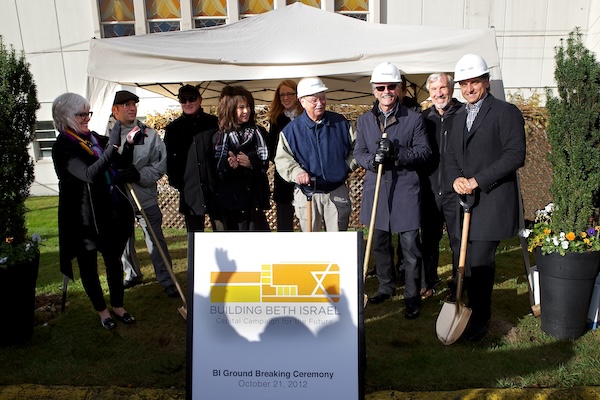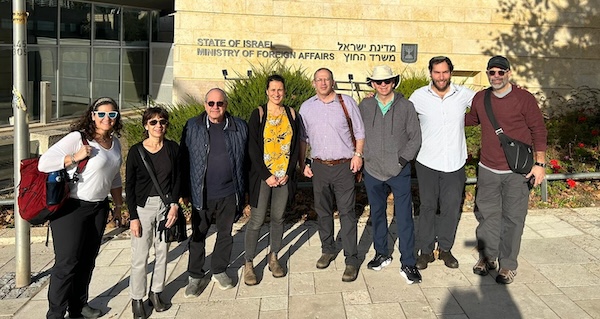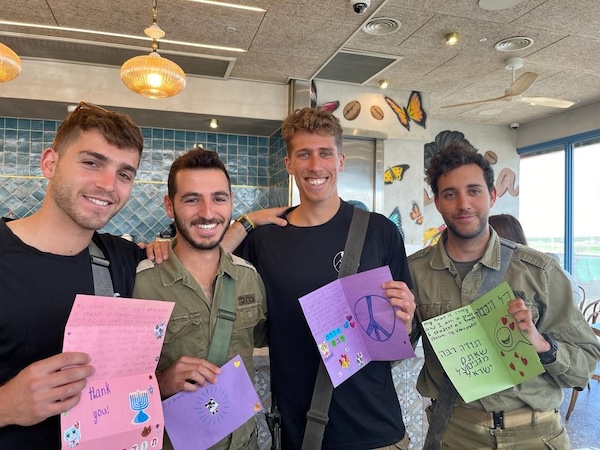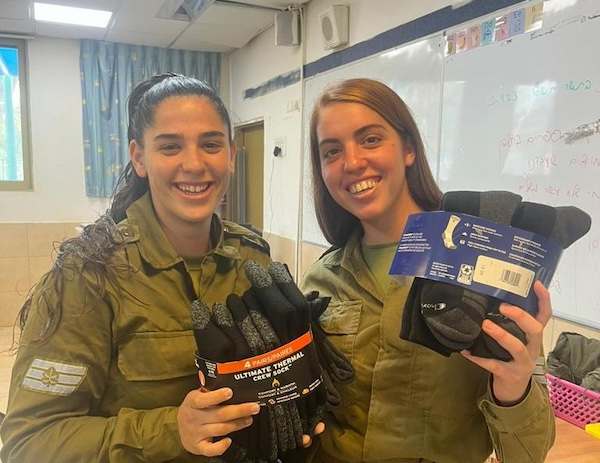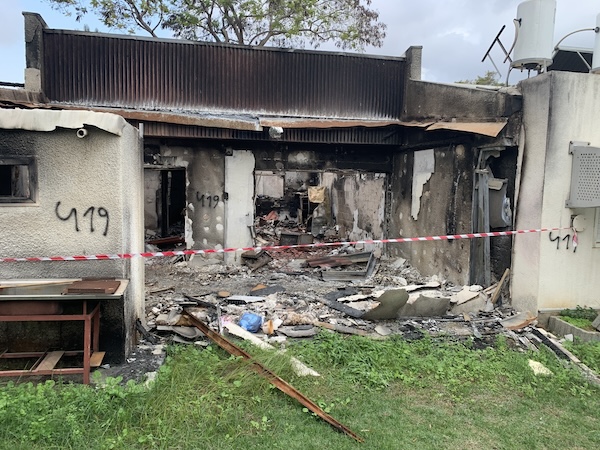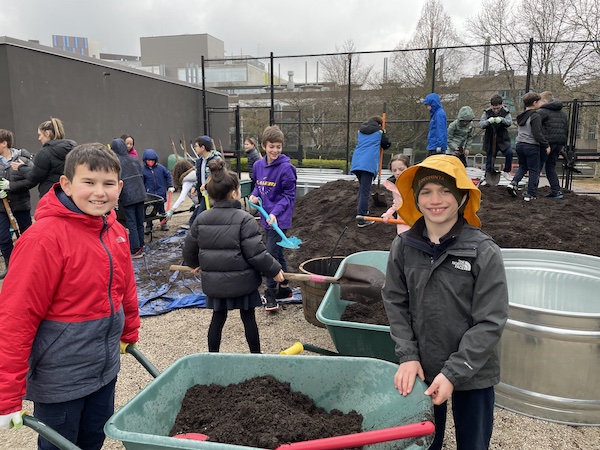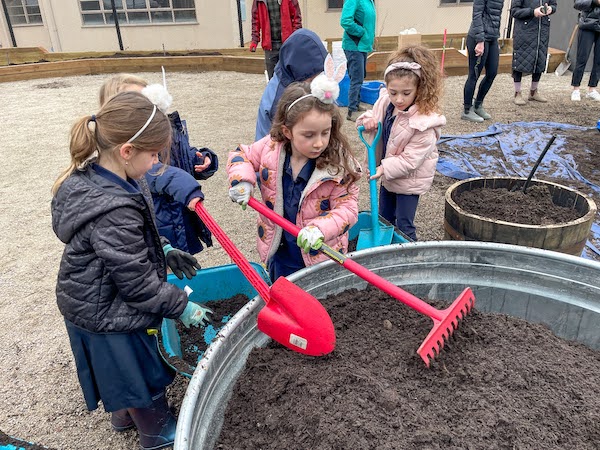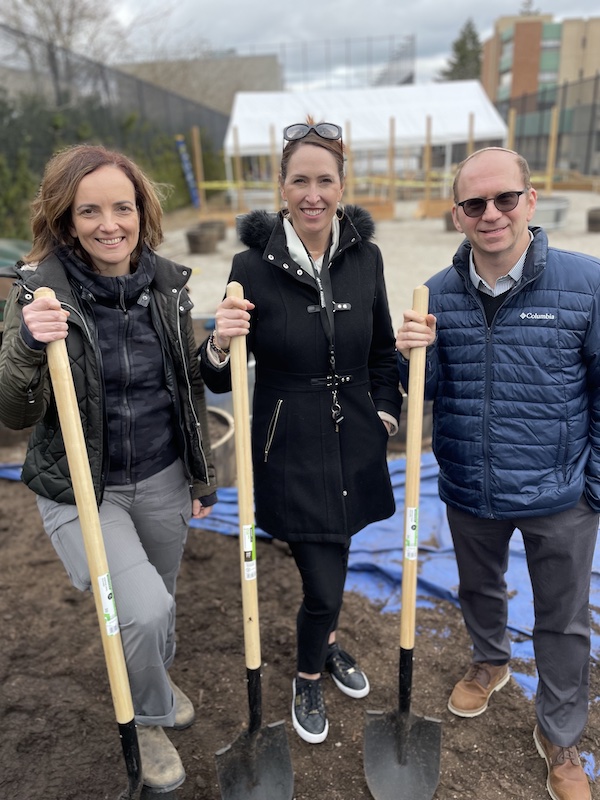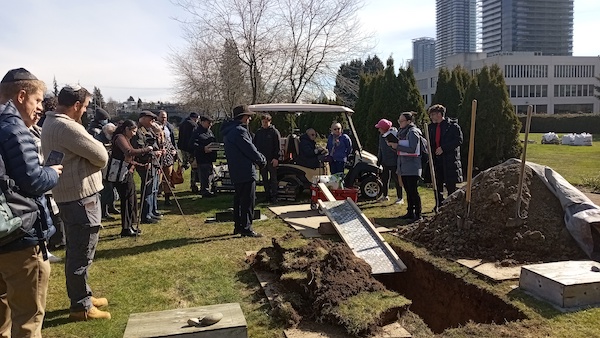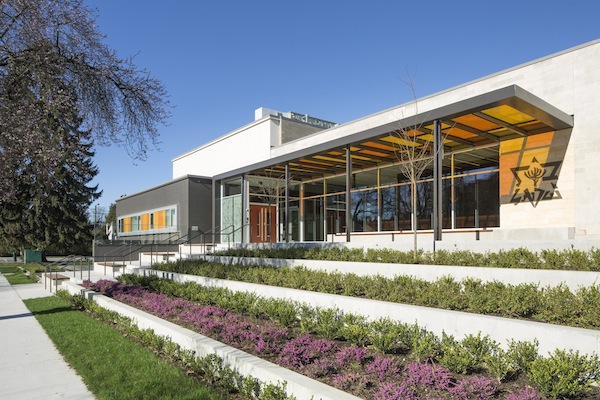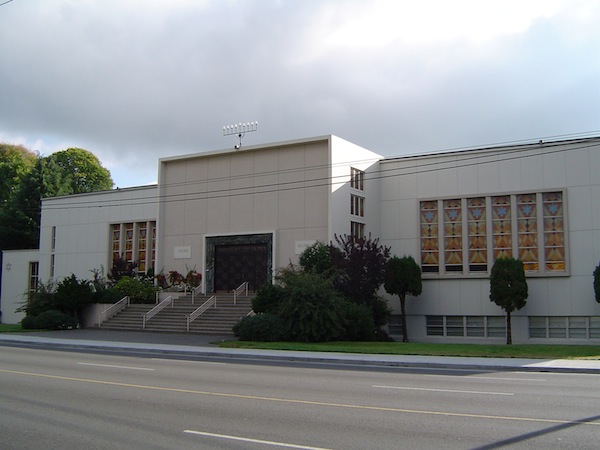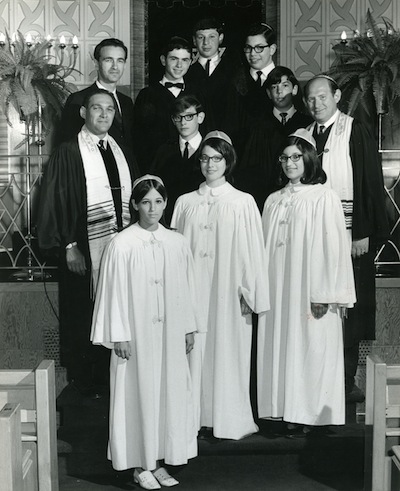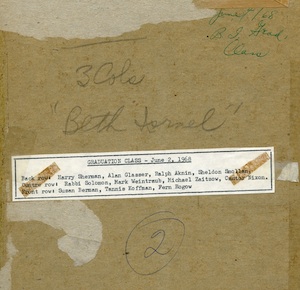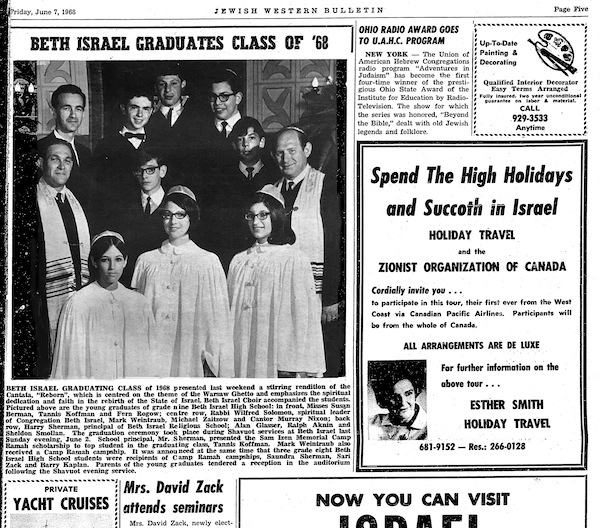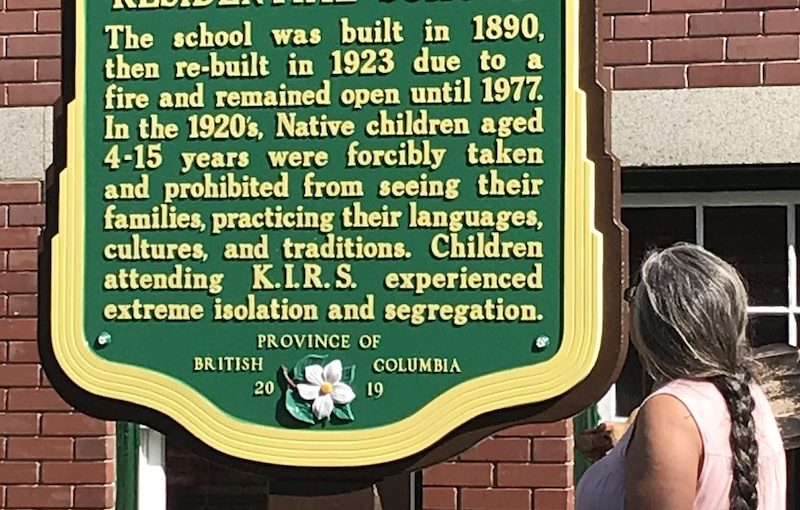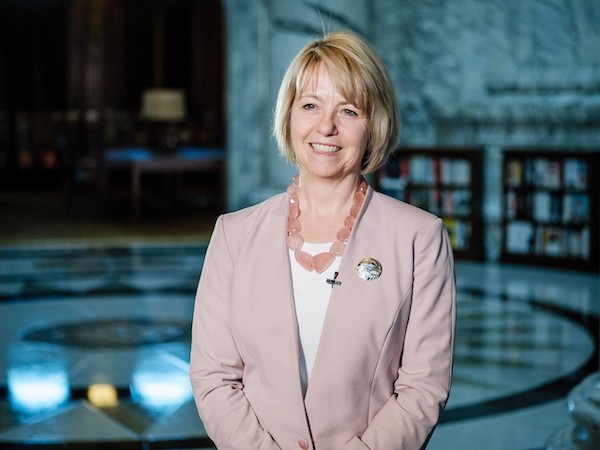At the 2012 groundbreaking, left to right: Catherine Epstein, Rabbi Jonathan Infeld, Stuart Gales, Sylvia Cristall, Michelle Gerber, Gary Averbach, Sam Hanson, Shannon Etkin and Alfonso Ergas. Obscured from view is Elliot Glassman. (Robert Albanese Photography)
On June 9, Congregation Beth Israel will celebrate the 10th anniversary of its new building at the sold-out Gerry and Ruby Gales Be the Light Gala. The event will honour the synagogue’s visionary leaders – the Lutsky, Gales, Averbach, Cristall, Glassman and Porte families – and the capital campaign’s co-chairs, Gary Averbach, the late Lorne Cristall and the late Hershey Porte, as well as building chair Alfonso Ergas, Burn-the-Mortgage chair Lee Simpson and former BI executive director Shannon Etkin.
“This new building will be built as a place for our synagogue community to grow and thrive,” Lorne Cristall told the Independent in a 2010 interview, as the capital campaign was starting up.
The new building, designed by Acton Ostry Architects Inc., would give the synagogue an east-facing sanctuary (towards Jerusalem), where it used to face north, and allow the congregation to host High Holiday services under one roof. The plan was to raise enough money that there would be little or no mortgage.
“The campaign began for $10 to $12 million plus about $2 to $3 million for an available piece of land on the southeast corner of the property that Shaughnessy Hospital had expressed a strong interest in purchasing,” Gary Averbach told the Independent in an interview earlier this week. “Even then, while running the numbers, it became quite difficult to see how … we could reach the $10 million mark, let alone the $12 million one.”
That became even more concerning, he said, once the designs were costed out, and the final tally was going to be closer to $18 million.
But the visionary donors being honoured, and many others, gave “unexpectedly generous gifts,” said Averbach, thanking Simpson and Bette-Jane Israels for their help raising the funds, and to Etkin, “who took over after we got the initial pledge.”
Averbach said, “Although we had been incredibly successful in our fundraising, having reached close to $20 million on the day we opened, the final price tag looked to be just over $25 million, and the lot had still not been sold.”
Etkin had found a potential buyer, but, when that deal looked as if it would collapse, Averbach called Gordon Diamond, who had earlier expressed interest in buying the land for possible Vancouver Talmud Torah expansion. It was a long process, said Averbach, “but, finally, thanks to Gordon and Leslie Diamond’s insisting that they find a way, the deal was done.
“There was a final Burn the Mortgage campaign with Lee, Bette-Jane and me. And, under Shannon’s leadership, we were able to pay off all but a little over a million dollars of the final cost of just over $25 million. I believe all that debt has been paid off now.
“An important note is that, of the almost $22 million raised, only two donations, totaling $118,000, came from non-members – and both those had a family history at the BI,” added Averbach.
“I suppose I could talk about all the important roles the Beth Israel synagogue, our shul, my shul, plays in our community, in our personal lives and in our spiritual lives,” Gerry Gales told the Independent about why he and his wife Ruby stepped up. “The answer is not complicated. There was a need. I was asked. I said yes. There was never a second thought in my mind. I do believe we are all here to help one another, to do what we can with what we have.”
He said, “Ruby and I find great comfort in being in our house of worship, our shul…. We know that we are a part of a great tradition, with roots that were planted thousands of years ago. It’s a tradition that will continue long after we are gone. When I think of all the people who have gathered together under this roof, I feel that I am but a small part of something so much larger than me and I feel that I am never alone.
“Then there is the practical role the shul plays in the unfolding of our lives,” he added. “The shul is a place where we come for prayers and to pray, the shul is the place where we can send our children to learn all our traditions and to be educated, the shul is a place where we come to celebrate, where we come to mourn, where we launch our children into adulthood.”
Simpson agrees. “I believe all synagogues play an important part in our Jewish lives. They are a place to gather, pray, gain spiritual renewal, comfort and peace. All so important to our mental and, therefore, physical being – even more important in our world today,” she said. “Plus, they give a sense of community. Seeing familiar faces, sharing a lunch or meal after services, all so important. They are also a place of learning and expanding our knowledge, answer our questions, gain wisdom from others.”
She said it was an honour for her and her husband Bernie to support Beth Israel.
“Beth Israel has been our synagogue for all of our married life – we were married there by Rabbi [Wilfred] Solomon,” she said. “Our children were named there, bat and bar mitzvahs were there and our grandchildren were also named and our grandson’s bar mitzvah has been there, and more to come. I was twice chair of the board of directors and involved in the building campaign.”
As for her involvement in the campaign, Simpson said, “For me, the final straw was at my son’s aufruf [being called to the Torah the Shabbat prior to the wedding]. The auditorium filled with family and friends was also filled with buckets to catch the rain coming in from the roof and windows. We needed more than Band-Aids.”
At the new building’s groundbreaking in 2012, Etkin cited a report from 1988 about a renovation being one of the shul’s “very important priorities.” He spoke about several efforts to move redevelopment forward, with the one that resulted in the new building starting eight years before construction was completed in 2014.
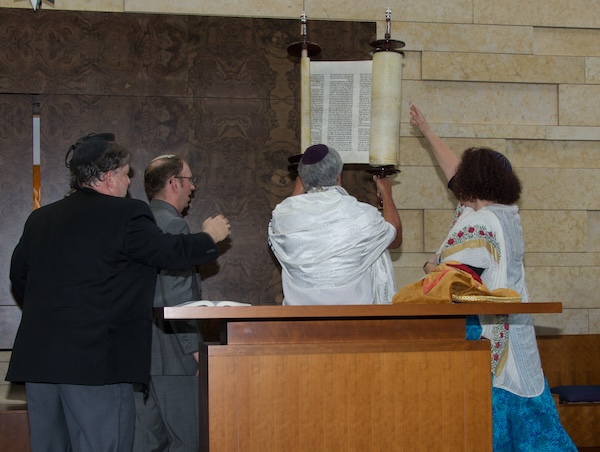
Acknowledging that he stood on the shoulders of Cristall and Porte, who “had been involved as co-chairs in various incarnations of the rebuilding of the Beth Israel Synagogue since at least the early 1990s,” Averbach said, “I had always taken an interest in the project, but it wasn’t until I joined the board around 2008 that I started to take an active interest. My interest was based on the fact that the existing building, besides being arguably halachically incorrect, was also in very sad disrepair.”
Cristall and Porte took Averbach out to lunch and asked him to deal with donors under the age of 55.
“After a few days, I agreed, and a couple of weeks later, Hershey passed away, and the ‘triumvirate,’ with me as junior partner became Lorne and me as co-chairs,” said Averbach. “Given Lorne’s serious illness, I knew my job had expanded many times.”
With the help and work of many people, and with the commitment of the congregation, the redevelopment finally happened.
“Since we opened our doors to our new and very beautiful building 10 years ago, we have seen significant increases in every aspect of synagogue life. Our membership is growing, and our program participant numbers have increased,” BI Senior Rabbi Jonathan Infeld, told the Independent. The clergy now includes Assistant Rabbi Adam Stein, Ba’alat Tefillah Debby Fenson and youth director Rabbi David Bluman.
“Since our new building project was completed, it has literally opened many doors for our congregation,” said Infeld. “We have had the blessing of hosting many large community events including this year’s Yom Ha’atzmaut celebration. We have had the flexibility to do many great programs that utilize all our spaces and meet the needs of many different age groups. The High Holidays are a perfect example of when we use almost every inch of the building. We have nearly 2,000 people come to our various High Holiday services each year and the space is a true blessing for all of us.” It also allows for more varied services and programs on Shabbat, said the rabbi.
“We are really looking forward to our sold-out gala this year, which will celebrate a decade of success because of the hard work and dedication of the people who helped make the dream of a new building possible,” he said. “I am so happy that there will be so many people present to say thank you to our visionaries and builders. Jacci Sandler and the gala committee have done a fabulous job already.”
The gala committee is Jennifer Apple, Kerry Benson, Samara Bordan, Chana Charach, Shannon Ezekiel, Shannon Gorski, Carol Konkin, Samantha Levin, Juliette Sandler, Paige Swartz and Leatt Vinegar. Sandler, head of development at Beth Israel and the creator of the Be the Light Gala, spoke with the Independent about this year’s event, which will feature, among others things, a concert by American-Israeli rapper/singer Nissim Black and a menu created by Israeli Chef Yaniv Cohen, owner of restaurant Jaffa Miami, and the Perfect Bite. Howard Blank will be the auctioneer and Sandler’s husband, Brett, will be master of ceremonies – he has a long history of fundraising in the community and chaired the JCC Sports Dinner twice.
For the main act, Jacci Sandler wanted an internationally known Israeli artist. Black fit the bill, and more.
“Not only are Nissim’s songs all about Judaism but they are filled with messages of spirituality, about hope, victory, friendship, belief, admiration, being lifted and much more,” said Sandler. “At the time we are in now, the Jewish community wants to be lifted and, at the Be the Light Gala, Nissim, with his beautiful words, will do just that. I received approval of this concept by my outstanding gala committee and executive director Esther Moses.
“With the occurrences in Israel this year, we wanted to celebrate the 10th year with an Israeli meal,” Sandler continued. “But we wanted a concept out of the box from the traditional options in Vancouver. Ricci Smith teamed up with Yaniv Cohen to do a Miami-style version of our Israeli meal… Our meal will be incorporating seven Israeli spices that represent kindness, strength, beauty, perseverance, splendour, foundation and royalty.”
Shannon Chung, with whom Sandler has worked before, will perform at the donor reception, which will be hosted at the house of Mark James.
“Beth Israel Synagogue is an essential part of who we are,” said Gerry Gales. “It serves the spiritual and human needs of us, the congregants. It is a focus for our Jewish community that allows us to come together and share our lives, for better or for worse, with each other. And our synagogue plays a role in making us a visible part of our larger community, the Vancouver community.
“In these stressful times, with war in our homeland and revival of old evils and antisemitism around us, we need a place where we can come together, where we can stand together. This is that place. The synagogue needs funding to be what we need it to be, and it needs our participation. If we do not fund it, if we do not make it work, who will?”
Averbach had a message for BI’s future generations.
“Just as I and many others worked long and hard at the renovation of the JCC between 1988 and 1995 and, just over 20 years later, we need to rebuild, so it will be with the BI,” he said. “Maybe it’ll be 30 years, but just remember – never underestimate the generosity of Greater Vancouver’s Jewish community!”

